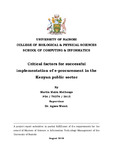Critical factors for successful implementation of e-procurement in the Kenyan public sector

View/
Date
2018Author
Mathenge, Martin M
Type
ThesisLanguage
enMetadata
Show full item recordAbstract
E-procurement is the usage of information and communication technology in performing all procurement process stages through the internet. It is aimed at ensuring that procurement transactions are transparent and efficient with a high degree of accountability. However, unlike the private organizations, the Kenyan public sector has not been successful in implementing electronic procurement. Corruption also persists in Kenyan public sector procurement despite e-procurement. This research was aimed at identifying critical factors which can ensure that electronic procurement is successfully implemented in the Kenyan public sector. The study adopted the exploratory research approach and had a population sample of 12 parastatals and 2 government ministries with 140 respondents. 110 questionnaires were filled and returned – a 79% response which was adequate for analysing and interpreting data. Analysis of data was conducted through frequencies, percentages and mean scores while multiple regression analysis obtained using SPSS was applied in hypothesis testing regarding the critical success factors‟ influence on successful electronic procurement implementation in Kenyan public organizations. The R square values were .828 for managerial factors, .878 for system factors and .930 for stakeholder factors. The three models reach statistical significance Sig = .000 with p less than .0005 implying that these results are statistically significant. In order of contribution to the dependent variable (implementation level), the beta values are .472 for managerial factors making them the strongest contributor followed by .375 for stakeholder factors and .230 for system factors. The research recommends Kenyan public organizations‟ top management should support e-procurement implementation and provide adequate resources for successful e-procurement implementation. There should also be proper data encryption, training programs for supply chain personnel and proper IT infrastructure set up. Kenyan public organizations should have a perfect connection with their business partners and suppliers and have an appropriate e-procurement implementation strategy with proper mechanisms for measuring, evaluating and controlling e-procurement implementation. Organizational systems should be engineered to be highly compatible to current e-procurement systems while adequate resources should be availed by the Kenyan government and top management in Kenyan public organizations for effective e-procurement implementation.
Key words
Critical success factors, information technology, electronic procurement, successful implementation, public sector.
Publisher
University of Nairobi
